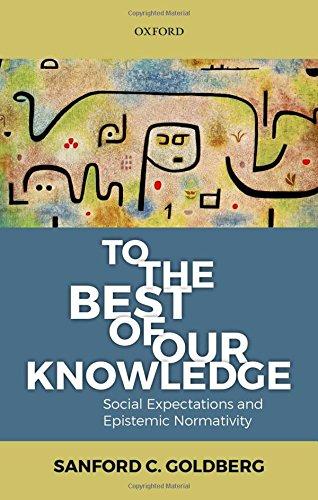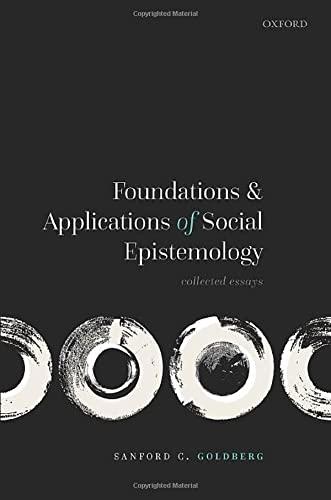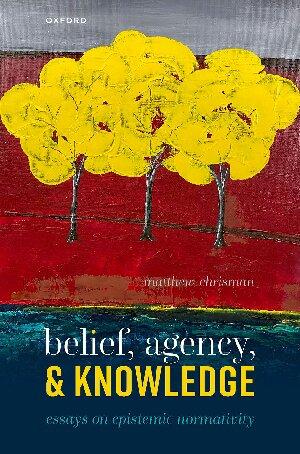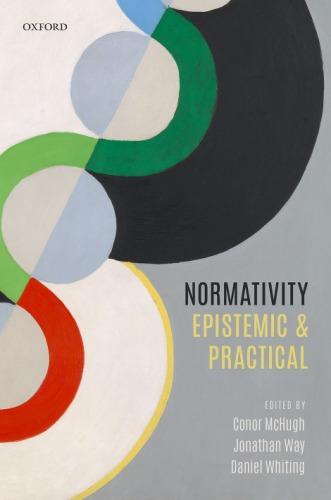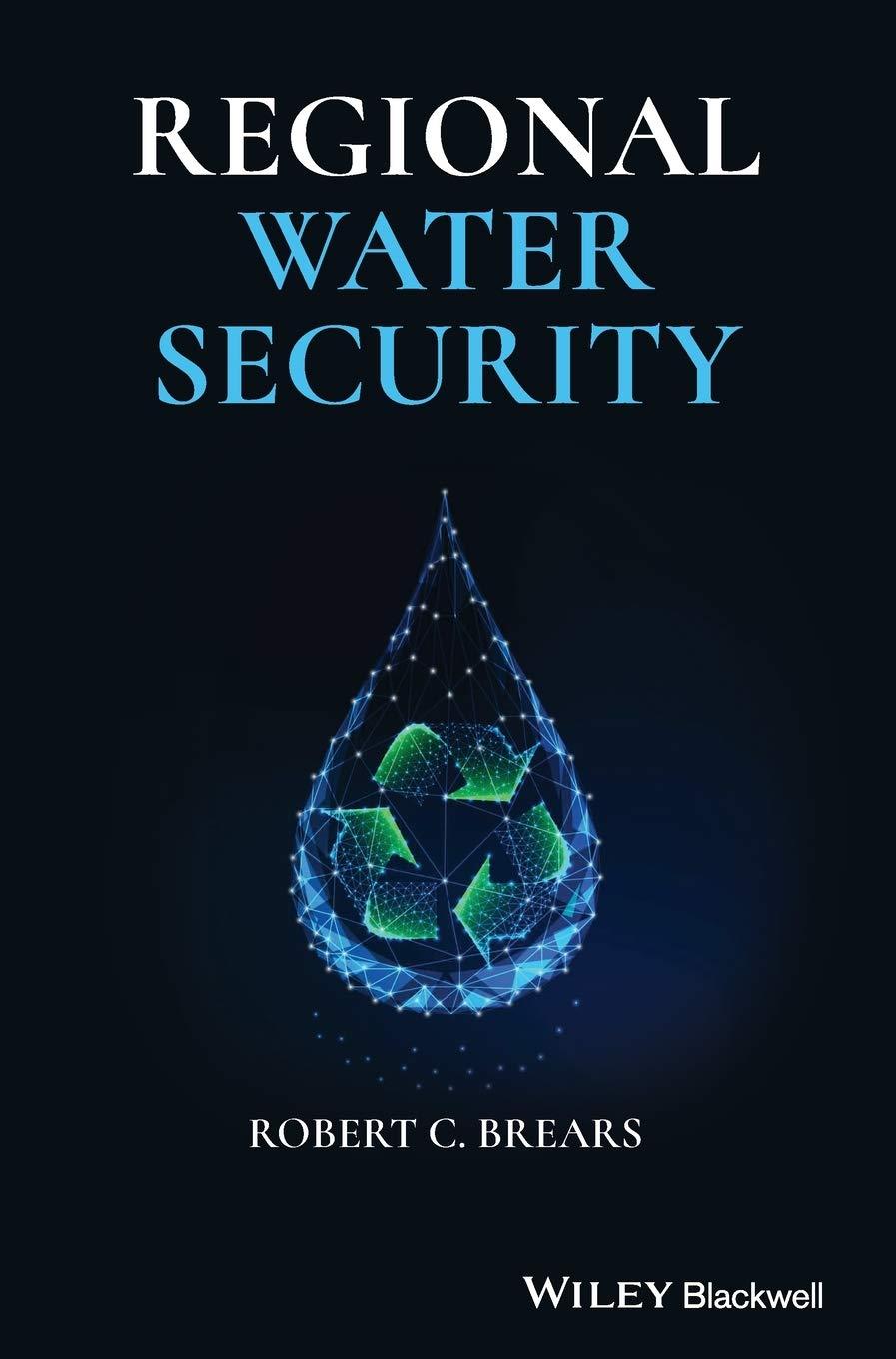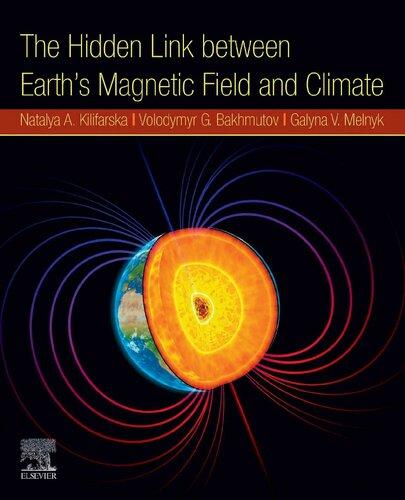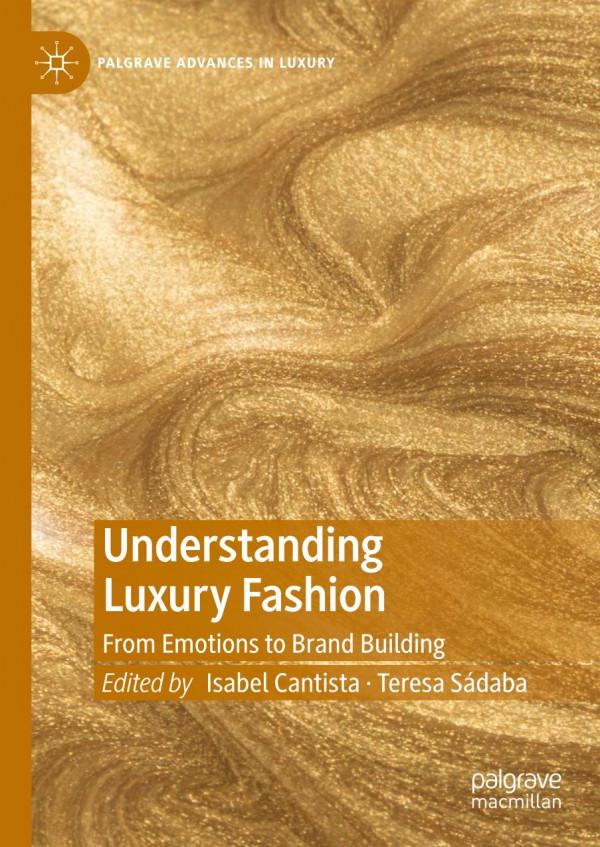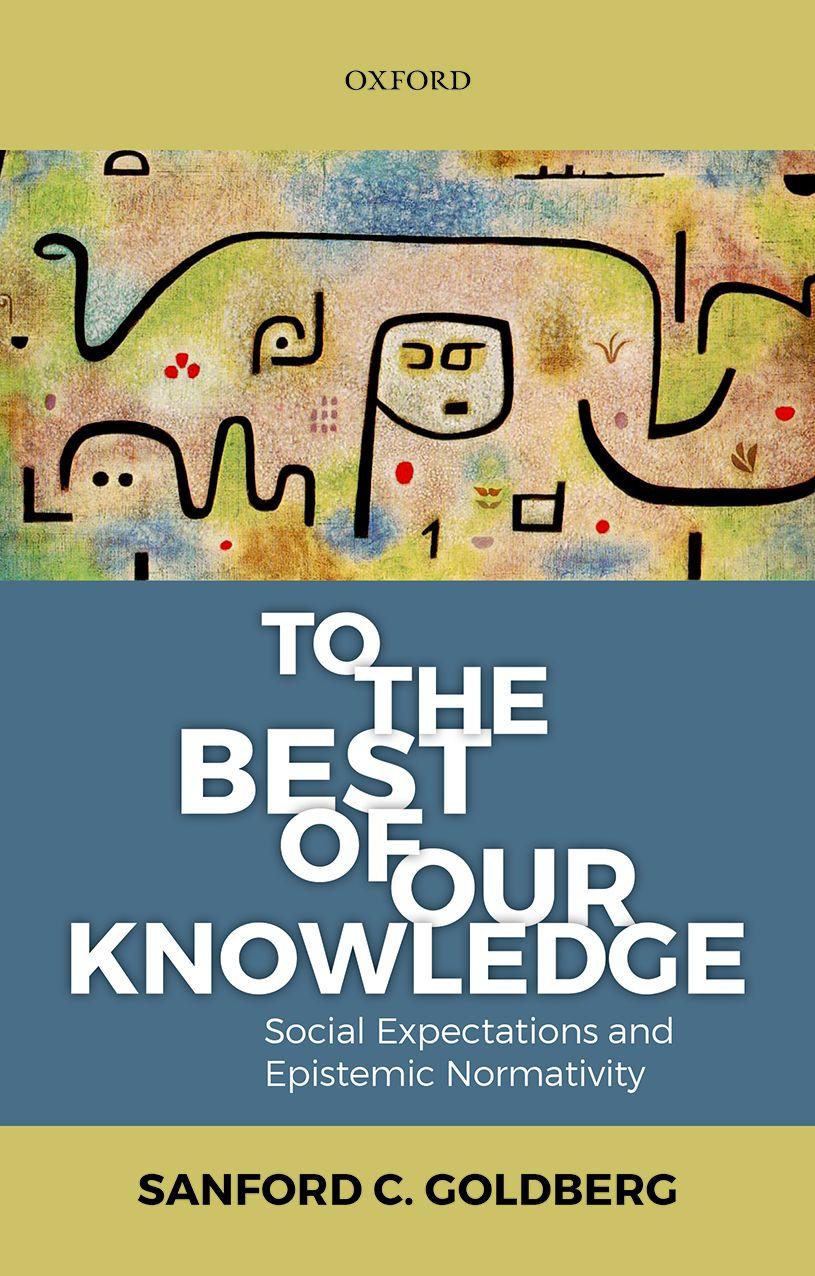https://ebookmass.com/product/to-the-best-of-our-knowledgesocial-expectations-and-epistemic-normativity-sanford-c-
Instant digital products (PDF, ePub, MOBI) ready for you
Download now and discover formats that fit your needs...
Foundations and Applications of Social Epistemology: Collected Essays Sanford C. Goldberg
https://ebookmass.com/product/foundations-and-applications-of-socialepistemology-collected-essays-sanford-c-goldberg/
ebookmass.com
Belief, Agency, and Knowledge: Essays on Epistemic
Normativity Matthew Chrisman
https://ebookmass.com/product/belief-agency-and-knowledge-essays-onepistemic-normativity-matthew-chrisman/
ebookmass.com
Normativity : epistemic and practical First Edition. Edition Mchugh
https://ebookmass.com/product/normativity-epistemic-and-practicalfirst-edition-edition-mchugh/
ebookmass.com
The Beethoven Syndrome Mark Evan Bonds
https://ebookmass.com/product/the-beethoven-syndrome-mark-evan-bonds/
ebookmass.com
Regional Water Security Robert C. Brears https://ebookmass.com/product/regional-water-security-robert-c-brears/
ebookmass.com
Protocols and Applications in Enzymology Seema Anil Belorkar & Sudisha Jogaiah
https://ebookmass.com/product/protocols-and-applications-inenzymology-seema-anil-belorkar-sudisha-jogaiah/
ebookmass.com
The Foiled Plan (War of Sins Book 2) Veronica Lancet
https://ebookmass.com/product/the-foiled-plan-war-of-sinsbook-2-veronica-lancet/
ebookmass.com
The Hidden Link Between Earth’s Magnetic Field and Climate 1st Edition Kilifarska N.A.
https://ebookmass.com/product/the-hidden-link-between-earths-magneticfield-and-climate-1st-edition-kilifarska-n-a/
ebookmass.com
Andrews’ Diseases of the Skin Clinical Atlas by William James, Dirk Elston, Patrick McMahon Andrews’ Diseases Of The Skin Clinical Atlas By William James
https://ebookmass.com/product/andrews-diseases-of-the-skin-clinicalatlas-by-william-james-dirk-elston-patrick-mcmahon-andrews-diseasesof-the-skin-clinical-atlas-by-william-james/
ebookmass.com
https://ebookmass.com/product/understanding-luxury-fashion-fromemotions-to-brand-building-1st-ed-2020-edition-isabel-cantista/
ebookmass.com
TotheBestofOurKnowledge TotheBestofOur Knowledge SocialExpectationsandEpistemic Normativity SanfordC.Goldberg
GreatClarendonStreet,Oxford,OX26DP, UnitedKingdom
OxfordUniversityPressisadepartmentoftheUniversityofOxford. ItfurtherstheUniversity’sobjectiveofexcellenceinresearch,scholarship, andeducationbypublishingworldwide.Oxfordisaregisteredtrademarkof OxfordUniversityPressintheUKandincertainothercountries
©SanfordC.Goldberg2018
Themoralrightsoftheauthorhavebeenasserted
FirstEditionpublishedin2018
Impression:1
Allrightsreserved.Nopartofthispublicationmaybereproduced,storedin aretrievalsystem,ortransmitted,inanyformorbyanymeans,withoutthe priorpermissioninwritingofOxfordUniversityPress,orasexpresslypermitted bylaw,bylicenceorundertermsagreedwiththeappropriatereprographics rightsorganization.Enquiriesconcerningreproductionoutsidethescopeofthe aboveshouldbesenttotheRightsDepartment,OxfordUniversityPress,atthe addressabove
Youmustnotcirculatethisworkinanyotherform andyoumustimposethissameconditiononanyacquirer
PublishedintheUnitedStatesofAmericabyOxfordUniversityPress 198MadisonAvenue,NewYork,NY10016,UnitedStatesofAmerica
BritishLibraryCataloguinginPublicationData
Dataavailable
LibraryofCongressControlNumber:2017954407
ISBN978–0–19–879367–0
Printedandboundby CPIGroup(UK)Ltd,Croydon,CR04YY
“AsIunderstandit, beingjustified isastatusonehasinrelationtoa personorgroupofpeople.Ifthat’snotwhatepistemologistshavein mindwhentheyspeakofepistemicjustification,Ihavenoidea whattheymean.”
SidneyMorgenbesser,inconversation(asIrecallit), somewherebetweenWest97thSt.andWest 116thSt.,NewYorkCity,Fall1994
ToJudy,withlove
1.EpistemicallyProperBelief:TheVeryIdea13
PartII.SocialExpectations,Epistemic 3.CoreCriteriaI:PermissionstoRelyonCognitiveProcesses75
3.4DirectandIndirectAccesstotheOutputsofaCognitiveProcess
3.5AssertionandIndirectAccesstoAnother’sCognitiveProcesses
3.6TheInterpersonalNatureofDefaultPermissionstoRely
3.7ANovelBasisforAnti-ReductionismintheEpistemology ofTestimony?
3.8PermissionstoRelyandEntitlementstoExpect
3.9Conclusion
4.CoreCriteriaII:Coherence-InfusedReliabilism(CIR)113
4.1TowardanAccountof PrimaFacie EpistemicPropriety
4.2 PrimaFacie ProprietyasReliabilityplusResponsibility
4.3Coherence-InfusedReliabilism(CIR)
4.4CIRvs.Bach’sAccountofDefaultReasoning
4.5 PrimaFacie EpistemicProprietyforBasicandNon-BasicBelief
4.6OurEntitledExpectationsregardingOtherEpistemicSubjects
5.GeneralExpectationsI:EntitlementstoExpectandSocial
6.GeneralExpectationsII:NormativeDefeatand Ultima Facie
6.1SocialEpistemicResponsibilityand UltimaFacie Epistemic Propriety
6.2Evidence,EpistemicExpectations,andEpistemicPropriety
6.4TheEpistemicSignificanceofEvidence:ATaxonomy
Acknowledgments Agoodportionofthisbookwaswrittenduringtheperiodofmyserving asco-PIonaMellonFoundationSawyerSeminarGrant(number 21300628)entitled, “TheFoundationsofSocialEpistemology.” Iwould liketobeginmyacknowledgmentsbyexpressingmygratitudetothat foundationforgivingustheresourcestohostavarietyofsocialepistemologyeventsatNorthwestern.Theseeventsenabledthemembersof Northwestern’ssocialepistemologygrouptointeractwitheachotheron aregularbasis;anditalsogaveustheopportunitytoengagewithso manyworld-classresearchersinsocialepistemology,fromdisciplines includingPhilosophy,Sociology,History,Psychology,PoliticalScience, Economics,Business,ComputerScience,PublicPolicy,Scienceand TechnologyStudies,Education,andInformationandLibrarySciences. Regular,engagedconversationsacrosssomanydisciplinesconvinced meoftheneedtorethinkhowIasanepistemologistapproachthetheory ofknowledge.
IwouldalsoliketothankthemanypeoplewithwhomIhavehad discussionsofthesemattersovertheyears.Withmysincereapologiesto thepeopleIamforgetting,thislistincludesSibelAdali,Kristoffer Ahlstrom-Vij,KenAlder,MahradAlmotahari,MarkAlznauer,Charity Anderson,ElizabethAnderson,NatalieAshton,RobertAudi,Murat Aydede,MaxBaker-Hytch,DominikBalg,AnnBaril,JohnBeatty, MatthewBenton,SvenBernecker,PaulBloomfield,PatBondy,Elke Brendel,AaronBronfman,JessicaBrown,TonyBrueckner,Fabrizio Cariani,AdamCarter,AlCasullo,MatthewChrisman,DavidChristensen, ChristinaChuang,LennyClapp,E.J.Coffman,AlixCohen,StewCohen, JuanComesaña,EarlConee,WayneDavis,LeandrodeBrasi,Imogen Dickie,JanDowell,JulienDutant,AnneEaton,KylaEbels-Duggan, AdamElga,KateElgin,MylanEngel,PascalEngel,StevenEpstein, EvanFales,RichFeldman,DonFallis,FelipoFerrari,CarrieFigdor, AliciaFinch,BrandenFitelson,AmyFlowerree,WolfgangFreitag,Lizzie Fricker,MirandaFricker,KarenFrost-Arnold,RichardFumerton,John Gibbons,TalGolan,AlvinGoldman,PeterGraham,JohnGreco,Mitch Green,StephenGrimm,ThomasGrundmann,SteveHales,AliHasan,
ReidHastie,JohnHawthorne,AllanHazlett,DavidHenderson,David Hilbert,TedHinchman,FrankHofmann,JoachimHorvath,Carrie Ichikawa-Jenkins,JonathanIchikawa-Jenkins,DanielImmerman,Shiela Jasanoff,JennJhun,CaseyJohnson,JesperKallestrup,ChrisKelp,Jenz Kipper,PeterKlein,MelissaKoenig,MattKopec,DirkKoppelberg, JoachimKorvath,AndreaKruse,JenniferLackey,CristinaLafont,Greg Landini,TonyLayden,NickLeonard,LaurenLeydon-Hardy,Javier Lezaun,ChiaraLisciandra,DomLopes,MichaelLynch,Donald MacKenzie,EllieMason,KayMathiesen,AidanMcGlynn,MattMcGrath, TristamMcPherson,BoazMiller,LucaMoretti,AdamMorton,Axel Mueller,RyanMuldoon,JerylMumpower,RamNeta,ErikOlsson,Carrie Osborne,OrestisPalmeros,AaronPanofsky,NikolajPederson,RikPeels, AlejandroPérezCarballo,FranciscoPerieraGanderillas,FabiennePeter, BryanPickel,TedPorter,TedPoston,GrahamPriest,DuncanPritchard, GeoffPynn,DaniRabinowitz,IsaacRecord,BaronReed,MikeRidge, DavidRipley,BlakeRoeber,LauraSchroeter,SallySedgewick,Steven Shapin,SusannahSiegel,DanielSilvermint,OriSimchen,MonaSimion, DanielSinger,BrianSkyrms,MartinSmith,DeclanSmithies,Miriam Solomon,DavidSosa,ErnieSosa,KentStaley,ErikStei,DavidStern,Jim Stone,EleanorStump,MikeTeitelbaum,JuliThorson,DebTollefson, NickTreanor,JohnTurri,KatyaVavova,JonathanVogel,LaniWatson, JanWieben,SamWheeler,SteveWhite,DanielWhiting,UriWilensky, MichaelWilliams,SarahWright,andKevinZollman.
Iwouldalsoliketothankthemembersofaudiencesatvariousvenues atwhichIhavepresentedsomeofthismaterial.Thesevenuesinclude severaldepartmentalcolloquiaatwhichIpresentedearlyversionsof thisworkastalks:NorthernIllinoisUniversity,NotreDame,St.Louis University,theUniversityofBritishColumbia,theUniversityofConnecticut,theUniversityofEdinburgh,theUniversityofIllinois-Chicago, andtheUniversityofMelbourne.Thesevenuesalsoincludevarious conferencesandworkshopsatwhichIgavepartsofthisbookastalks; theseincludethe2010ChambersConference(“ThePointandPurposeof EpistemicEvaluation”),theRutgersEpistemologyWorkshop(May 2013),theUniversityofIowaPhilosophyDepartment(whereIspenta weekinApril2014asIdaBeamDistinguishedLecturer),aworkshopon “DoxasticAgencyandEpistemicResponsibility” atBochumUniversity (Bochum,Germany,June2014),the “EpistemicNormsasSocialNorms” conferenceatSt.LouisUniversity(March2015),UniversidadAlberto
HurtadoinSantiago,Chile(whereIspentaweekinMay2015lecturing onthenotionofsocialepistemicresponsibility),theSocialEpistemology WorkshopattheUniversityofEdinburgh(Edinburgh,Scotland,March andJune2015),andastintasPhilosopherinResidenceatIowaState University,whereIgavelecturesonsocialepistemologyinOctober2015. Iamgratefulaswelltothestudentsinmyfall2016graduatephilosophy seminaratNorthwestern(“TheNatureofBelief”),forhumoringme whentopicsrelatedtothebookprojectcameupinseminardiscussion.
Iwouldalsoliketothankthethreephilosophydepartmentsandthe respectiveuniversitieswhereIfoundmyintellectualhomefortheperiod ofthewritingandrevisingofthisbook.The firstismyhomePhilosophy DepartmentatNorthwesternUniversity.ThesecondistheEidyn ResearchCenterassociatedwiththeDepartmentofPhilosophyatthe UniversityofEdinburgh,whereIspentthreesummersasaProfessorial Fellow(summers2013–15).ThethirdisthePhilosophyDepartmentat theUniversityofColognewhere,undertheauspicesofaninvitation fromThomasGrundmanntogiveagraduateseminarinsocialepistemology,Iwasabletospendthesummerof2016,andwhereIwas graciouslyaffordedtheopportunitytogetextensivefeedbackfroma readinggroupcomposedoffacultyandgraduatestudentswhoreada draftofmymanuscriptinitsentirety.
Finally,IwouldliketothankthreeanonymousrefereesforOxford UniversityPressforextremelyhelpfulandinsightfulcommentsand criticismsofanearlierdraftofthismanuscript;andPeterMomtchiloff, aswellastheteamofpeopleatOxfordUniversityPress,forbeingso supportivethroughouttheperiodofthewritingandrevisingofthis manuscript.
Portionsofthisbookcontainpreviouslypublishedmaterial,and Iwouldliketoexpressmygratitudetothepublishersforgrantingme permissiontodoso.
Chapter1containssectionsfrommypaper “WhatistheSubject-Matter oftheTheoryofEpistemicJustification?” InD.Hendersonand J.Greco(eds.), EpistemicEvaluation:PurposefulEpistemology (Oxford:OxfordUniversityPress,2015),pp.205–23.
Chapter2containsportionsfrommypaper “TheAsymmetryThesis andtheDoctrineofNormativeDefeat,” AmericanPhilosophical Quarterly 54:4,pp.339–351(2017).
Chapter3containsportionsfrommypaper, “InterpersonalEpistemic Entitlements, ” PhilosophicalIssues 24:1,159–83(October2014).
Chapter4includesahighlyrevisedversionofmypaper, “AReliabilist FoundationalistCoherentism,” Erkenntnis 77:2,187–96(2012).
Chapter5containsasectionofmypaper, “ShouldHaveKnown,” Synthese 194:8,pp.2863–2894(2017).
Chapter6isahighlyrevisedversionofmypaper, “OntheEpistemic Signi fi canceofEvidenceYouShouldHaveHad,” Episteme 13:4, pp.449 –470(2016).
Introduction TheAimofthisProject 0.1TheAimandDistinctiveness ofthePresentProject Thisbookconcernsthenatureofepistemicassessmentastraditionally construed thatis,thesortofassessmentthatpertainstowhethera givensubject’sbeliefamountstoknowledge.Myguidingideasarethree: suchassessmentisnormative;itissensitivetosocialfactors;andthese twofeaturesareintimatelyrelatedtooneanother.Myoverarchingaimis toarticulateanddefendtheseideas.
Thebook’scorethesiscanbestatedinsummaryformasfollows:we expectcertainthingsofeachotherasepistemicsubjects,anditisthe normativityoftheseexpectationsthatunderwritesthenormativityof epistemicassessmentitself.IndevelopingthisclaimIaimtohonorthe insightsofbothinternalistandexternalistapproachestoepistemicjustification.WiththeinternalistIembracetheideathatknowledgeablebelief requiresbeliefthatisformedandmaintainedinanepistemicallyresponsiblefashion;withtheexternalistIembracetheideathatknowledgeable beliefrequiresbeliefthatisformedandsustainedthroughareliableprocess. Iproposetomarrythesetwodimensionsintoasingleaccountofthe standardsofepistemicassessment.Thismarriagereflectsourprofound andineliminabledependenceononeanotherforwhatweknowofthe world adependencewhichisrationalizedbytheexpectationsweare entitledtohaveofoneanotherasepistemicsubjects.Theexpectationsin questionarethosethroughwhichweholdeachotheraccountableto standardsofboth(epistemic)reliabilityand(epistemic)responsibility.
Severalfeaturesofmyproposalarenovel;theseareworthhighlighting attheoutsetofthebook.
First,andperhapsmostimportantly,Iwillbereversingwhatmany willregardasthenaturalwaytothinkabouttherelationbetween epistemicnormsandsocial(epistemic)expectations.Itisnaturalto thinkthattheepistemicnormsthatgovernbeliefexplainorrationalize theexpectationswehaveofoneanotherasepistemicsubjects.According tosuchaview,whateachofusexpectsofotherepistemicsubjects orat anyratewhatweare entitled toexpectofthemregardingsuchthingsas thestateoftheirknowledgeorhowwell-supportedtheirbeliefsare reflects(i)theepistemicnormsorstandardsinplay,togetherwith(ii) factsaboutthesubjectinquestion(thestateofherevidence,thecognitiveprocessesshehasavailabletoher,etc.).Thisnaturalviewhasa corollary:bysatisfyingthesenormsorstandards,anepistemicsubject ensuresthatshewillhavemetwhateverepistemicexpectationsothers wouldbeentitledtohaveofher.TheviewIwillbeadvocatingin thisbook,bycontrast,reversestheorderofexplanation.Onmyview, epistemicnormsthemselvesaregroundedinandreflectthelegitimate social(epistemic)expectationswehaveofoneanother.AsImightputit: whenlegitimate,ourepistemicexpectationsofoneanothergeneratethe propernormsorstandardstobeusedwhenweengageintheepistemic assessmentofoneanother’sbeliefs;anditisbysatisfyingthoseexpectationsthatanepistemicsubjectensuresthatshewillhavemetallrelevant epistemicnormsinplay.Suchaviewraisesahostofissuesregardinge.g. thesourceoflegitimacyforoursocialexpectationsandtheobjectivityof theresultingnormsthemselves.ThroughoutthisbookIwillbeatpains toshowthattheseissuescanbeadequatelyaddressed.
Thisnon-standardexplanatoryaccountattheheartofmyproposalis relatedtoasecondnovelfeatureIshouldliketohighlight.Itispopular thesedaystothinkofknowledgeasprovidingthe “normofbelief,” so thatoneshouldn’tbelievewhatonedoesn’tknow.WhileIhavesome sympathiesforthis ‘knowledge-first’ approach,Idon’tthinkitisquite right,andinthisbookIdevelopanovelargumentforanalternative account.Onmyalternative,thenormofbeliefreflectswhatweare entitledtoexpectofoneanotherasbelievers;andwhatweareentitled toexpectofoneanotheristhateachofusformsandmaintainsour beliefsinsuchawaythat, insofarastheworlditselfisrelevantlycompliant,weare(wouldbe)knowledgeable.Inonerespect,myalternativeisa returntoamoretraditionalapproachtoepistemicnorms:myaimisto bearticulatingastandardforwhattraditionmighthavecalled justified
belief.Butitispartoftheburdenofthisbooktotrytoprovidean independentbasisforidentifyingthatstandard.Tomakethisclear,and toavoidthebaggagethatisassociatedwiththenotionofepistemic justification,Iwillbeusingtheexpression ‘epistemicpropriety ’ throughouttodesignatethestandardinquestion;andmyclaim thatthe standardIwillbearticulatingundertherubricof ‘epistemicpropriety’ justis thestandardthattraditionsoughttocharacterizeasepistemic justification isitselfadvancedasawaytoilluminatethenatureof epistemicjustification(and,whereneeded,clarifyand/orprecisifythe standardofjustification).
Myattempttoarticulatethatstandardyieldsathirdnovelfeatureof thebook’sproposal.Attheheartofthediscussionintheliterature regardingthatstandard,atleastasithastakenplaceinthetheory ofjustification,loomsthefamiliarinternalism/externalismdebate.
Iwillbeadvancingtheideathatthisdebatereflectstwodistinctyet fundamentalkindsofepistemicexpectationweareentitledtohave ofoneanother.Ontheonehand,weareentitledtoexpectoneanother toemployreliablebelief-formingprocesses;andwecanthinkofthe expectationofreliabilityasgeneratingabroadlyexternalistcondition onepistemicpropriety.Ontheotherhand,weareentitledtoexpect oneanothertoberesponsibleinthewayweform,maintain,and reviseourbeliefsovertime;andwecanthinkoftheexpectationof responsibilityasgeneratingabroadlyinternalistconditiononepistemic propriety.
Minimally,suchresponsibilityrequiresbeingsensitivebothtoone’ s evidenceregardingthe(un)reliabilityofone’sbelief-formingprocesses andmethods,andtothebackgroundbeliefsonealreadyhas.Butitis veryimportanttomyprojectthatthisisnotallthatepistemicresponsibilityinvolves;andthisbringsmetothefourthnovelfeatureofmy proposal,havingtodowithaphenomenonIwillcall normativedefeat. Sometimesoneformsthebeliefthatponthebasisofgoodevidence (orwhatonehasreasontoregardasgoodevidence),andyetother considerationspreventone’sbelief,soformed,fromcountingasjustified. Followingseveraldecadesoftradition,wecanthinkoftheseconsiderationsas ‘defeaters’ (andone’swould-bejustificationas ‘defeated ’).
BorrowingatermfromLackey(1999),Iwillcallthis normative defeat, wherethisisunderstoodtobethesortofdefeatthatderivesfrom considerationspertainingtotheevidenceoneshouldhave.
Thisphenomenonhasnotreceivedsystematicorsustainedattention intheepistemologyliteratureondefeatanddefeaters.Whatismore, evenwhenithasbeendiscussed,thephenomenonofnormativedefeat hasneverbeenproperlyunderstood.Itisnothardtoappreciatewhythis mightbe.Mostcontemporaryepistemologistswillregarditasatruism thatevidencenotpossessedbyasubjectisepistemicallyinert,inthe sensethatsuchevidenceisneverrelevanttoanepistemicassessmentof thesubject’sbeliefs.(Inaslogan:onlypossessedevidencemattersepistemically.)Butnowsupposethatamongtheevidenceonedoesn’thave isevidencethatothersproperlyexpectedonetohavehad.Ifwecanmake senseofsuchapossibility andIwillbearguingthatwecan then amongtheevidenceone doesn’t haveisevidenceone should have.Now, bythelightsofthe “truism” above,theevidenceoneshouldhavehadis epistemicallyinert.(Perhapsasubject’sfailuretohavesuchevidence rendershermorallyorsociallyorprofessionallyirresponsible;butinany casetheproponentofthe “truism” willinsistthatsuchunpossessed evidencehasnobearingon epistemic assessment.)Iwanttoarguethat suchaviewiswrongheaded:evidenceoneshouldhavehadisnotepistemicallyinert,andthe “truism” thatimpliesotherwiseis(notmerely unobviousbut)false.Inparticular,Iwillbearguingthatsuchevidencecan serveasanormativedefeaterforthejustificationofbelief.Thepossibility ofnormativedefeathighlightswhatformearethemostfar-reachingofthe implicationsofsocialexpectationsonepistemicnormativity.
0.2AnticipatingtheLikelyReactions ofDistinctAudiences IanticipatethattheaccountofepistemicassessmentIwillbedefending inthisbookwillbeseenbysomeasunacceptablyradical,andbyothers astooconservative.
Itwillbeseenbysome especiallybysometraditionalepistemologists asunacceptablyradical.Iwillbedefendingaviewaccordingtowhich epistemicassessmentinvolvesstandardsthatreflectavarietyofexpectations othersareentitledtohaveofasubject’sepistemiccondition.Theseinclude expectationsregardingsuchmattersasherbasicperceptualcompetences, hersensitivitytopotentialcounterevidence,herbackgroundknowledge, herfamiliaritywithvariousknowledgesources,theevidenceshehas,her
ongoingresponsibilitiestocollectevidenceofvarioussorts(ortoattendto certainsourcesetc.),andsoforth.Sinceatleastsomeoftheseexpectations aregeneratedbythesocialpracticesandinstitutionsofhercommunity,and sincethesepracticesandinstitutionsreflectthestandardsatplayinthat community,theresultisthattherewillbecasesinwhichasubject’ s epistemicstanding,asdeterminedbythesortofepistemicassessment Iamenvisaging,dependsinpartontherelevantsocialstandardsthat prevailinhercommunity.InthiswaytheaccountIdevelopacknowledges thatdifferencesinsocialexpectationsfromcommunitytocommunitycan makefordifferencesinepistemicstandardsfromcommunitytocommunity.Itisforthisveryreasonthatmanyepistemologistswillrecoilatthe account,regardingitasunacceptablyradical(forbeingoverlysocialin orientation).
Atthesametime,theaccountIwillbedefendingwillbeseenbyothers astooconservative.(Ianticipatesuchareactionfromsometraditional “sociologistsofknowledge” andthosesympathetictoScienceandTechnologyStudies.)Iwillbedefendingtheideathat,whilesocialstandards arerelevanttoepistemicassessmentinthewayjustdescribed,itis onlywhenthesatisfactionofthosestandardsis reliabilityenhancing (inasensetobearticulated)thatthefailuretosatisfytheminagiven caseisepistemicallysignificant.Thisconstraint,whichispartandparcel ofabroadlyreliabilistepistemology,placesanobjectiveconstraint ontheepistemicstandardstowhichsubjectscanbeproperlyheld. Manytheoristswillrecoilatsuchaconstraint,regardingitasoverly conservative.
Formyownpart,IbelievethattheaccountIdefendinthisbookgets thingsjustright.Itconnectsthenormativityofepistemicassessment withthesocialnatureofsuchassessment,whileatthesametime embracinganobjectivecriterionforepistemicstandardsthemselves. Theresultisapictureonwhichknowledgeandjustificationrequire reliablyformedresponsiblebelief,wherethesortofresponsibilityat issueinvolvessatisfactionoftheexpectationsweareentitledtohaveof oneanotherasepistemicsubjects.TheconnectionIampursuing betweenthe socialnature andthe normativity ofepistemicassessment, then,isseeninournormativeepistemicexpectationsofoneanotheras epistemicsubjects:asepistemicsubjectsweholdoneanotheraccountabletovariousstandardsinparticularcontexts.Sometimesthestandards inquestionreflectthesocialorinstitutionalrolestheassessedsubjectis
playing;atothertimesthestandardsderivefromapersonalorprofessionalrelationshipthattheassessedsubjectbearstotheassessor;andat stillothertimesthestandardsareimposedmerelyinvirtueofthefact thatthepersoninquestionisamemberoftheknowledgecommunityat large.Atthesametime,myaccountembracestheobjectivityofepistemic standards,asthestandardsthemselvesmustprivilegethetrueoverthe false,thereliableoverthelucky.History,sociology,andanthropology teachusthatcommunitieshavehistoricallyembracedallsortsofepistemicstandards.Butwhenthestandardsthemselvesarenotreliabilityconducive,epistemologymustdemur.
0.3ChapterOrganizationoftheBook Thisbookisstructuredaroundmyaimofrevealingtheinterconnections betweenthenormativityandthesocialnatureofepistemicassessment.
Tothisend,Ibegin,in Chapter1,byofferingaprogrammaticaccount ofthesortofnormativitythatisattheheartofepistemology.Bymy lights,thisisthesortofnormativityinvolvedinassessmentsofwhethera subject’sbeliefsatisfiestheepistemicstandardsonknowledge.(Asnoted, Iwillcallanybeliefthatsatisfiesthesestandardsan epistemicallyproper belief.)Iargueagainsttheviewthatnothingshortofknowledgeitselfcan providethestandards,andproceedtoarguefortheviewthatthetheory ofepistemicjustificationisinthebusinessofarticulatingtherelevant standards.Appealingtomyconstrualoftheinternalism/externalism disputeinthetheoryofjustification,Iconcludebymotivatinga desideratum onanysuchaccount:itshouldregardepistemicproprietyas involvingbothareliabilitydimensionandaresponsibilistdimension.
Chapter2 addresseswhatIsuspectwillbethemainobjectionto thinkingthattherecanbeanysuchaccount.Theobjectionisthatno accountofepistemicjustification andsonoaccountofepistemic propriety canbeunifiedandwellmotivatedifithastosatisfybotha reliabilitydimensionandaresponsibilistdimension.Againstthis,Iargue thattherecanbesuchanaccount.Thekeytoseeingthisistorecognizea keyfeatureofevaluativeassessmentgenerally:foragreatmanyevaluativeassessments,whethertheobjectunderassessmentpassesmuster dependsnotonlyonwhetheritsatisfiestheevaluativecriteriaarticulatingthestandard,butalsowhetheritsatisfiesthegeneralexpectations operativeinthedomaininwhichthatstandardisinplay.Ifthisis
correct,thenassessmentsofepistemicjustification andhenceofepistemicpropriety willinvolvetwodistinctdeterminations,oneconcerningwhethertheexplicitepistemiccriteriaweresatisfied,theother concerningwhetherthegeneralexpectationswebringtobearinepistemicassessmentweresatisfied.Icallabeliefthatsatisfiestheexplicit epistemiccriteria ‘primafacie epistemicallyproper’;andIreserve ‘ultima facie epistemicallyproper’ todescribethosebeliefsthatare primafacie epistemicallyproperandthatalsosatisfythegeneralexpectationswe bringtobearinepistemicassessment.Thisanalysispavesthewayforthe restofthebook.InChapters3–4Idevelopanaccountof primafacie epistemicproprietythatisbroadlyreliabilist(albeitincorporatinga minimalresponsibilistcomponent);andinChapters5–6Icapturea morerobustresponsibilistdimensioninmyaccountof ultimafacie epistemicpropriety,developedintermsofthegeneralexpectationswe bringtoepistemicassessment.
Chapter3 isthe firstoftwochaptersaimingtoarticulatetheexplicit criteriaforepistemicallyproperbelief.ItdealswithwhatIregardasthe firstissueonefacesinthetaskofarticulatingtheexplicitepistemic criteriaforbelief.Itisperenniallytemptingtosupposethatabeliefcan satisfythedemandsofepistemology thatitcanbenormativelyproper fromtheepistemicpointofview onlyifthebelievingsubjectcancertify forherselfthereliabilityofeachandeveryprocessshereliedoninbeliefformation.Butinsistingonthisquicklyleadstothethreatofaninfinite regress:toconfirmthereliabilityofoneprocessoursubjectwouldneed evidence,butthatevidencewoulditselfbeacquiredthroughthesubject’ s relianceonsome(possiblydistinct)processwhoseownreliabilitywould needtobeconfirmed,andsoon.This,ofcourse,isoneversionofthe ‘problemofthecriterion.’ Idefendafoundationalistresponsetothis problem,accordingtowhichweenjoyadefault(albeitdefeasible)permissiontorelyoncertaincognitiveprocessesinbelief-formation.Theseare processesthatsatisfywhatIcallthe ReliabilistRationale.Importantly,our permissionsherearesocial:anyoneofusispermittedtorelyonanytoken processthatsatisfiesthisrationale,whetherthetokenprocessresidesin one ’sownmind/brainorthatofanotherepistemicsubject.
Chapter4 completesmyaccountoftheexplicitcriteriaforepistemicallyproperbelief.Itbeginswiththefollowingquestion:givenabelief formedthroughaprocessorprocessesonwhichthesubjectenjoyeda defaultpermissiontorely,underwhatconditionsdoesthebeliefsatisfy
the(remainderofthe)explicitcriteriausedinepistemicassessment? MyanswerdevelopsaversionofProcessReliabilism,whichIcall Coherence-InfusedReliabilism(CIR).Accordingtothisview,abelief formedthroughaprocessonwhichthesubjectenjoyedadefaultpermissiontorelysatisfiestheremainingexplicitcriteriaonepistemicallyproper beliefwhen(i)theprocessesinquestionwerereliable(orconditionally reliable),and(ii)thepropositionalcontentofthebelief,aswellasthe hypothesisassertingthereliabilityoftheprocessesasusedonthisoccasion, cohereswiththesubject’sbackgroundbeliefs.Afterarguingthatsuch aviewiswellmotivated,Isuggestthatcondition(ii)amountstothe exemplificationofaminimalkindofepistemicresponsibility.Theresult isthatwehaveanaccountoftheconditionsof primafacie epistemic propriety.
WhiletheaccountIdevelopof primafacie epistemicproprietyisthus abletorequireaminimalsortofepistemicresponsibility thesort oneexempli fieswhenoneavoidswhatIcall baldincoherence inone’ s beliefs Iarguethatknowledgeitselfrequiresasortofepistemicresponsibilitythatgoesbeyondthis. Chapter5 beginstodevelopmyargument forandaccountofthatsortofresponsibility.Itpursuestheideathat epistemicresponsibilityisamatterofsatisfyingthegeneralexpectations othersareentitledtohaveofoneasanepistemicsubject.Ibeginby notingthatweareentitledtocertain “basic” expectationsofoneanother asepistemicsubjects expectationsweareentitledtohaveofone anothermerelyinvirtueofourbeingepistemicsubjects.Iarguethat theseexpectationsarecapturedinmyaccountof primafacie epistemic proprietyfromChapters3–4.Theresultisthatabeliefis primafacie epistemicallyproperifandonlyifitsatisfiesalloftheexpectationsothers areentitledtohaveofonemerelyinvirtueofone’sstatusasanepistemic subject.However,othersareentitledtohavefurtherepistemicexpectationsofus,andChapter5characterizesthesource,extent,andlegitimacyofthesefurtherexpectations.Iarguethattheyderivefromoursocial practices,andtheirlegitimacyreflectsthelegitimacyofthosepractices. Chapter6 thenproceedstodevelopanaccountofhowourlegitimate epistemicexpectationsofoneanotherbearonepistemicassessment itself.Iclaimthatbecauseweareentitledtoexpectoneanothertolive uptotheepistemicresponsibilitiesassignedtousinlegitimatesocial practices,theresultisthatafailuretodosoputsone’sbeliefatriskof epistemicimpropriety.Whetherone’sbelief is epistemicallyimproper
owingtoafailureofepistemicresponsibility,Iargue,dependsonwhat wouldhavebeenthecasehadonefulfilledallofone’sresponsibilities.If theresultwouldhavebeenabeliefthatfailedtosatisfytheconditionson primafacie epistemicpropriety,thenone’sbelieffailstobeepistemically proper.Inthecourseofbringingthisout,Ihaveanopportunityto addresstheliteratureonculpableignorance,andtodistinguish therisk ofepistemicimproprietyfromepistemicimproprietyitself.(Itishere thatIdevelopmyaccountofnormativedefeat.)
Chapter7 concludesbyaddressingahostofworriesthatonemight haveaboutmyaccountofepistemicproprietyandepistemicresponsibility.Chiefamongtheseareworriesaboutthethreatofsocialrelativism inepistemicassessment,thethreatofanoverlycontext-sensitiveaccount ofepistemicproprietyandepistemicresponsibility,thechallengeto vindicatethatonecanbeepistemicallyresponsibleevenwhilealoneon adesertisland(andsowhensystematicallyisolatedfromothers),andthe lackofengagementinmyaccountofepistemicresponsibilitywithany discussionofdoxasticvoluntarismordoxasticcontrol.Iconcludethat noneoftheworriesshouldleadustorejecttheproposalonoffer.
0.4TheSocialDimensionsofKnowledge Thisbookispartofalargeragendaofmine:togetcontemporary epistemologyto(continueto)inchitswaytowardafullappreciationof thesocialdimensionsofknowledge.Wegoagooddistancetoward understandingtherichsocialcomplexityofknowledgewhenweappreciatethesocialpracticesandnormsofourvariousknowledgecommunities.Happily,thesearemattersthathavebeenextensivelystudied already,albeitbyresearchersoutsideoftraditionalepistemology:historiansandphilosophersofscience,sociologistsofknowledge,proponents ofScienceandTechnologyStudies,andothers.I finditunfortunate whenresearchintheseareasiscombinedwithhighlyideologicalcommitmentstovariousstrong(oftenhighlyskeptical)claimsaboutobjectivity,oraboutthenatureofandprospectsforknowledge.Itypically findmyselfrejectingsuchclaims.Butatthesametime,Ialso findit unfortunatethatmoreempiricallyorientedresearchintoourknowledge communitiesiswidelyignoredintraditionalepistemologycircles,typicallyoutofanimpatiencewiththoseideologicalcommitments.Iurge suchepistemologistsnottothrowouttheproverbialbabywiththe

